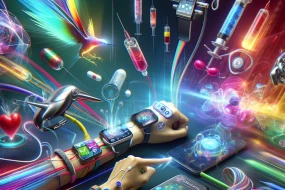
In the ever-evolving landscape of technology, the advent of 5G has been nothing short of a revolution. As we stand on the brink of a new era in mobile health applications, or mHealth, the implications of 5G technology are profound. This new generation of wireless communication promises to transform how we manage our health, making it more efficient, accessible, and personalized than ever before. Let's delve into how 5G is reshaping the mHealth industry, the opportunities it presents, and the potential pitfalls we must navigate.
Understanding 5G and Its Unique Capabilities
To appreciate the impact of 5G on mobile health applications, it's crucial to understand what sets 5G apart from its predecessors. Unlike 4G, which primarily focused on increasing data speeds, 5G offers a trifecta of benefits: ultra-low latency, massive connectivity, and enhanced bandwidth. This means not only faster download speeds but the ability to connect a multitude of devices simultaneously with minimal delay. Imagine a hospital environment where every medical device communicates seamlessly, or a rural clinic accessing real-time patient data without interruption. The possibilities are endless, and the infrastructure is now robust enough to support these innovations.
Transforming Patient Monitoring and Telemedicine
One of the most immediate impacts of 5G is in the realm of patient monitoring and telemedicine. The ultra-low latency of 5G allows for real-time monitoring of patients' vital signs through wearable devices. This means healthcare providers can receive instantaneous alerts if a patient's condition changes, enabling swift intervention. Furthermore, telemedicine consultations can become more interactive and realistic, with high-definition video calls that are free from the lag and buffering issues that plague current systems. This enhanced connectivity ensures that patients in remote areas have access to the same quality of care as those in urban centers, bridging a critical gap in healthcare delivery.
Enhancing Data Management and Security
The influx of data from wearable devices and remote monitoring systems necessitates robust data management solutions. 5G's enhanced bandwidth supports the transfer of large datasets at unprecedented speeds, making it easier to aggregate and analyze patient information. However, with great power comes great responsibility. The increased volume of sensitive health data raises significant security concerns. Ensuring data privacy and protection against cyber threats must be a priority for developers and healthcare providers. Common mistakes to avoid include neglecting encryption protocols and failing to update security systems regularly. Only by addressing these vulnerabilities can we build trust in mHealth applications.
Facilitating AI and Machine Learning in Health Applications
5G's ability to handle vast amounts of data with minimal delay opens new doors for artificial intelligence (AI) and machine learning in healthcare. These technologies thrive on data, and with 5G, AI-driven applications can provide more accurate diagnostics, personalized treatment plans, and predictive analytics. For instance, AI algorithms can analyze patient data in real-time to predict potential health issues before they become critical. However, the integration of AI into mHealth applications is not without its challenges. Developers must ensure that AI systems are transparent, ethical, and designed to augment rather than replace human decision-making.
Boosting Accessibility and Reducing Health Inequities
One of the most promising aspects of 5G in mHealth is its potential to democratize healthcare access. By enabling reliable connectivity in underserved areas, 5G can help reduce health disparities. Mobile health applications powered by 5G can provide educational resources, diagnostic tools, and telehealth services to communities that previously lacked access to such services. However, it's important to ensure that these technologies are user-friendly and culturally sensitive to truly meet the needs of diverse populations. Avoiding overly complex interfaces and considering language barriers are critical steps in making mHealth solutions inclusive and effective.
Challenges and Ethical Considerations
While the benefits of 5G in mHealth are numerous, there are challenges and ethical considerations that must be addressed. The rapid pace of technological advancement can lead to inequities if not all populations have equal access to 5G networks and compatible devices. Moreover, the ethical implications of data collection and AI-driven decisions in healthcare must be carefully considered. Ensuring informed consent and maintaining transparency with patients about how their data is used are essential practices. Developers and policymakers must work together to create guidelines that protect patient rights while fostering innovation.
The Road Ahead: Preparing for a 5G-Enabled Future
As we look to the future, the integration of 5G into mHealth applications holds exciting promise. However, realizing this potential requires collaboration between technology developers, healthcare providers, and policymakers. Investment in infrastructure, education, and policy development is critical to ensuring that the benefits of 5G are fully realized and equitably distributed. By staying informed and proactive, stakeholders can navigate the challenges and harness the transformative power of 5G to improve healthcare outcomes worldwide. The journey may be complex, but the destination—a more connected, efficient, and personalized healthcare system—is well worth the effort.






























